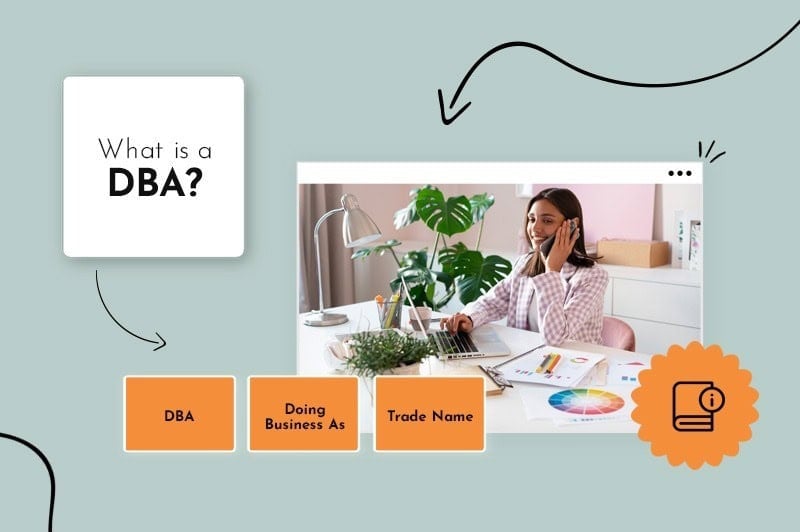Starting a business involves making numerous decisions, one of which is choosing the right name under which to operate. You might have come across the term “DBA” and wondered what it entails and how it fits into the broader business landscape. This article aims to demystify the concept of “Doing Business As” (DBA), explaining its definition, purpose, and relationship with business structures like LLCs.

A DBA, short for “Doing Business As,” is a registered pseudonym that allows individuals or companies to conduct business under a name different from their legal one. It’s also referred to as a trade name, fictitious business name, or assumed name.
Essentially, a DBA enables businesses to operate under a more marketable or descriptive name without forming a new legal entity. For example, if Jane Doe, a sole proprietor, wants to run her bakery under the name “Sweet Delights,” she would register “Sweet Delights” as her DBA.
All business types, like sole proprietors, partnerships, Limited Liability Companies, and corporations, can use a DBA.

Businesses opt for DBAs for various reasons:
Branding Flexibility: A DBA allows a business to present itself to the public with a name that reflects its products or services, enhancing marketing efforts.
Expansion Opportunities: Companies can use DBAs to enter new markets or offer new products without creating separate legal entities.
Legal Compliance: Operating under a name different from the legal business name without a DBA can lead to legal complications and penalties.
For example:
Imagine you live in North West Seattle, want to start a landscaping business, and run it as a sole proprietor or a side business to your existing LLC.
Here, you’d either have to use your name or your LLC’s registered business name, which might not fit your new start-up, engage your target audience’s attention, or suit local SEO.


Understanding the distinction between a DBA and and creating an LLC is crucial for entrepreneurs:
Legal Structure vs. Name Registration:
LLC (Limited Liability Company): An LLC is a legal business structure that provides limited liability protection to its owners, separating personal assets from business debts.
DBA: A DBA is merely a registered alias and does not constitute a separate legal entity. It doesn’t provide liability protection or affect the business’s legal structure.
Liability Protection:
LLC: Offers personal liability protection, meaning owners’ personal assets are generally safeguarded from business liabilities.
DBA: Provides no liability protection; the legal entity behind the DBA remains responsible for all debts and obligations.
Taxation:
LLC: Can choose its tax treatment (e.g., sole proprietorship, partnership, S-corporation), offering flexibility in how income is taxed.
DBA: Does not influence taxation; the underlying business entity’s tax status remains unchanged.

Many franchise owners form an LLC before investing in a franchise because of the liability protection.
By filing a DBA, the same as the parent franchise company, they can use the franchise name to establish credibility and promote their business identity.
For instance, say you buy a Dunkin (Dunkin’ Doughnuts) franchise using your business entity, Perk Up LLC. Your next step would be registering a Dunkin DBA with your state to trade as a Dunkin franchise.
The result is each Dunkin franchise in the USA can use the Dunkin DBA name and operate using their official business name.
The difference is significant to you and your branding; a DBA is a name you use for business, while a trademark protects and stops your competitors from using it.
Only 2 U.S. states provide businesses with exclusive rights to a DBA, Alaska and North Dakota. But it only applies at the state level. If you want to protect your name nationally or don’t trade in those states, consider trademarking your fictitious business name.
Sole proprietors and general partnerships only need a DBA if they operate their business using a name other than their legal name.
The reason is general partnerships, and sole proprietorships are unincorporated, so don’t register “articles of incorporation” or a business name with their location’s secretary of state.
Sole proprietors and general partnership owners are their businesses, so they use their legal names for the business name unless they file a DBA.
The process of registering a DBA varies by state and locality but generally involves:
Name Availability Search: Ensure the desired DBA name isn’t already in use or trademarked.
Filing the DBA: Submit the appropriate forms to the relevant state or county agency, often the Secretary of State or County Clerk’s office.
Public Notice: Some jurisdictions require publishing a notice in a local newspaper to inform the public of the new DBA.
Renewal: Be aware of renewal requirements to maintain the DBA’s active status.
A DBA is a valuable tool for entrepreneurs seeking flexibility in branding and business operations. While it offers numerous benefits, it’s essential to understand that a DBA doesn’t create a separate legal entity nor provide liability protection. Carefully assess your business needs and consult with legal or financial professionals to determine if registering a DBA aligns with your strategic goals
No, DBA requirements vary by state and locality. It’s essential to check with your state’s business filing office to determine if registering a DBA is necessary for your business operations.
No, a DBA is not a separate legal entity; therefore, it does not have its own Tax Identification Number (TIN). The TIN of the underlying business entity applies to the DBA.
The duration of a DBA registration varies by jurisdiction. Some require renewal every few years, while others may have longer periods. Always verify the specific requirements in your area.
Yes, an LLC can register multiple DBAs, allowing it to operate different businesses or brands under the umbrella of the same legal entity.
Registering a DBA does not provide exclusive rights to the business name. To secure exclusive rights, consider trademarking the name at the federal level.
This portion of our website is for informational or educational purposes only. Tailor Brands is not a law firm, and the information on this website does not constitute legal advice. All statements, opinions, recommendations, and conclusions are solely the expression of the author and provided on an as-is basis. Accordingly, Tailor Brands is not responsible for the information and/or its accuracy or completeness. It also does not indicate any affiliation between Tailor Brands and any other brands, services or logos on this page.
Products
Resources
©2025 Copyright Tailor Brands